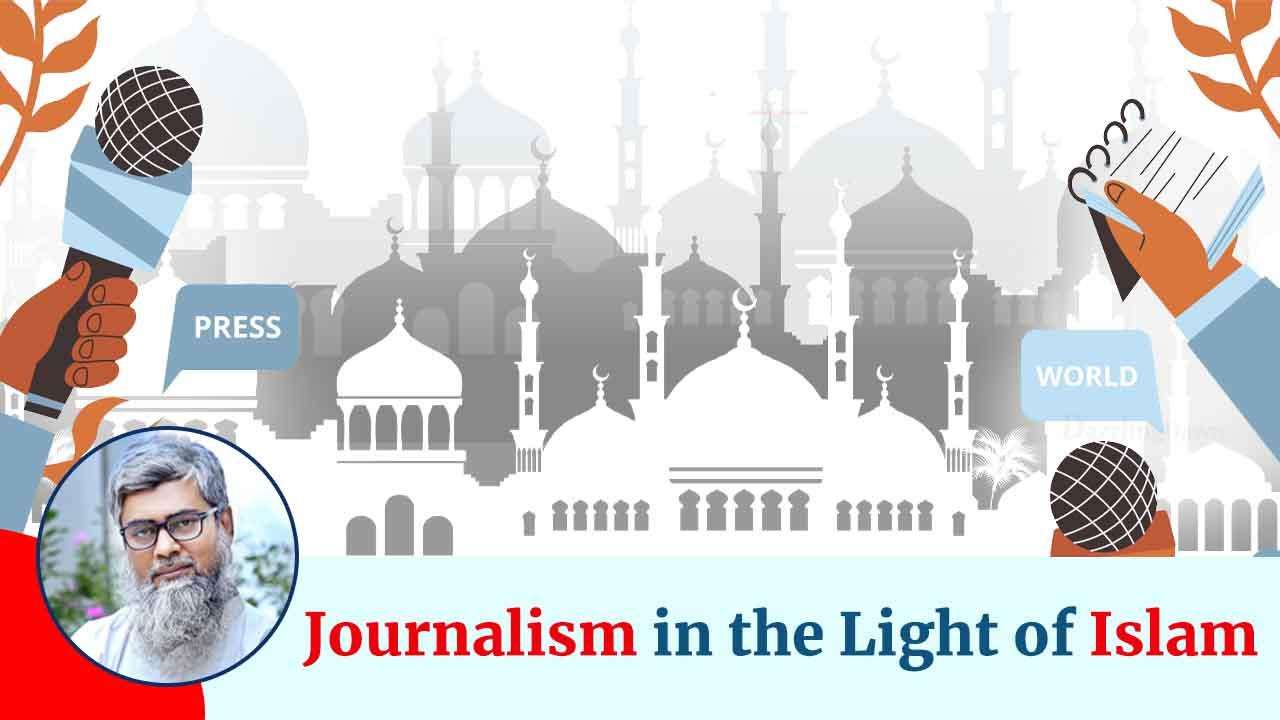Introduction
Journalism serves as the mirror of society. Newspapers, television, online platforms, and social media all constitute crucial avenues for expressing human thought, disseminating information, and shaping opinions. However, a critical question arises: how devastating can the impact be when this news or information is false, distorted, or one-sided? In the modern world, we witness daily how a fabricated story, a misinterpretation, or a manipulated image can influence public opinion, mislead individuals, and sometimes even ignite violence and riots.
Islam recognized this reality long ago. Approximately fourteen centuries ago, Allah (SWT) provided a unique directive in Surah Al-Hujurat, serving as the cornerstone of journalistic principles:
"O you who have believed, if there comes to you a disobedient one with information, investigate, lest you harm a people out of ignorance and then become regretful for what you have done." -(Surah Al-Hujurat, Verse 6)
This verse is not merely for Islamic societies but provides a universal foundation for journalistic ethics. Verification of truth, responsibility, and honesty – these three core principles remain the backbone of journalism today.
News Verification: Islamic Guidance
Islam regards the verification of information and news not just as an ethical duty but as an integral part of faith. This Quranic verse was revealed in response to a specific incident. Walid ibn Uqba (RA) was sent by Prophet Muhammad (PBUH) to collect Zakat from a tribe. Due to some misunderstandings en route, he returned and reported that the tribe refused to pay Zakat. The Prophet (PBUH) intended to take punitive action without verification, but Allah (SWT) revealed this verse, warning him: "Do not make any decision without verifying."
This verse teaches the Muslim community that disseminating opinions, decisions, or news based on hearsay or unverified information is not permissible in Islam. This principle forms the fundamental tenet of journalism: fact-checking and verification.
The Ethical Perspective of Journalism
A journalist's primary responsibility is to uncover the truth, present information in the public interest, and establish justice and balance in society. Islam upholds these same principles. Prophet Muhammad (PBUH) stated:
"Whoever speaks a word that is not true, while he knows it to be false – he is recorded as a hypocrite by Allah." (Sahih Bukhari: Hadith No. 392)
In essence, journalism is not just a profession; it is a form of amanah (trust). Just as a journalist's pen or microphone can influence human hearts, so too can incorrect information ignite the flames of unrest in society.
Social Consequences of Misinformation
In today's society, the flow of information is so rapid that a fake news story can reach millions within minutes. Social media platforms like Facebook, X (Twitter), and YouTube often prioritize "views" and "shares" over news verification. This blurs the distinction between truth and falsehood.
Islam opposes this trend and fosters awareness. In Surah An-Nur (24:15), Allah says:
"When you received it with your tongues and said with your mouths that of which you had no knowledge, and you thought it was insignificant while with Allah it was great."
This means that speaking or propagating unverified information is a grave sin in the sight of Allah. Thus, Islam teaches: no dissemination without verification.
Core Principles of Islamic Journalism
From an Islamic perspective, some fundamental principles of journalism are outlined below:
- Truthfulness: Speaking the truth and refraining from falsehood is a core Islamic ethic. In journalism, this is the foremost condition. Information should not be published without thorough verification.
- Justice and Fairness: Islam opposes unjustly accusing anyone or propagating one-sided information. Maintaining balance in news reporting is essential.
- Respect for Privacy and Dignity: Islam commands the protection of personal dignity and privacy. Journalists should not disseminate information that damages someone's reputation or creates division in society.
- Responsibility: The power to influence through journalism is immense. Therefore, every word, every piece of news, must be published with utmost responsibility.
- Purpose and Intention (Niyyah): In Islam, the value of deeds depends on intentions (niyyah). Journalism is similar. If the intention is to establish truth and justice in society, it can be considered a work pleasing to Allah.
Social Media and the Islamic Perspective
In this era, "everyone is a journalist." Mobile phones and social media enable everyone to disseminate information. But does everyone understand journalistic ethics?
Every day, we see fake images, distorted videos, misleading headlines, or trolls—which spread instantly. This leads to the harassment of many innocent people and creates societal division.
From Islam's viewpoint, this is akin to Gheebah (backbiting) or Buhtan (false accusation). Prophet Muhammad (PBUH) said:
"Gheebah is to mention about your brother that which he dislikes. And if what you say is not present in him, then it is Buhtan (slander)." (Muslim 2589; Abu Dawud 4874; Tirmidhi 1934)
Therefore, before posting or sharing on social media, it is a Muslim's duty to verify: Is this information true? Is it harming anyone?
Modern Application of Islamic Journalism
Islamic journalism does not mean only propagating religious news; rather, it means following Islamic ethics at every stage of journalism. For example:
- Verifying sources before publishing news,
- Protecting the dignity of others,
- Avoiding hate speech or divisive rhetoric,
- And above all, working with the fear of Allah at the core.
By adhering to these principles, journalism will not just be a medium of information but a beacon of light in society.
The Purpose of Journalism: Spreading Justice and Light in Society
In Islam, the dissemination of knowledge and information is an act of worship if it is for justice. Journalism is the modern form of that worship. A journalist's pen can be the language of peace or a tool of falsehood.
Islam teaches us:
- "Speak the truth, even if it is bitter."
- "Verify, for harm can come from ignorance."
- "Stand for justice, even if it is against yourself."
These are the true directives of journalism.
Conclusion
Journalism today is a powerful social institution. But its power is beneficial only when guided by justice, truth, and responsibility. Islam emphasizes these three values.
The verse from Surah Al-Hujurat serves as an eternal ethical guideline for every journalist and reader:
"If a disobedient one comes to you with information, verify, lest you harm someone out of ignorance."
This teaching is equally applicable to journalism today. False news, misleading headlines, or propaganda are not news at all; rather, they are tools that destroy societal trust and peace.
Therefore, journalism in the light of Islam means:
- Being truthful,
- Protecting the honor of others, and
- Wielding the pen with responsibility.
When journalism is illuminated by this ethical light, it becomes not merely a vehicle for information but a servant of humanity.
References:
- Al-Quran, Surah Al-Hujurat (49:6)
- Al-Quran, Surah An-Nur (24:15)
- Sahih Bukhari, Hadith No. 6093
- Sahih Muslim, Hadith No. 2589; Abu Dawud 4874; Tirmidhi 1934
- Yusuf, H. (2015). Islamic communication ethics. Islamic Research Institute.
- Ahmad, K. (2018). Media ethics and Islam: a comparative study. International Journal of Islamic Thought, 13(2), 45–56.
--
Author: Ruhul Amin Rushd, Senior News Editor, Banglavision,
Dhaka, Bangladesh. (ruhulrushd@gmail.com)








.svg)

